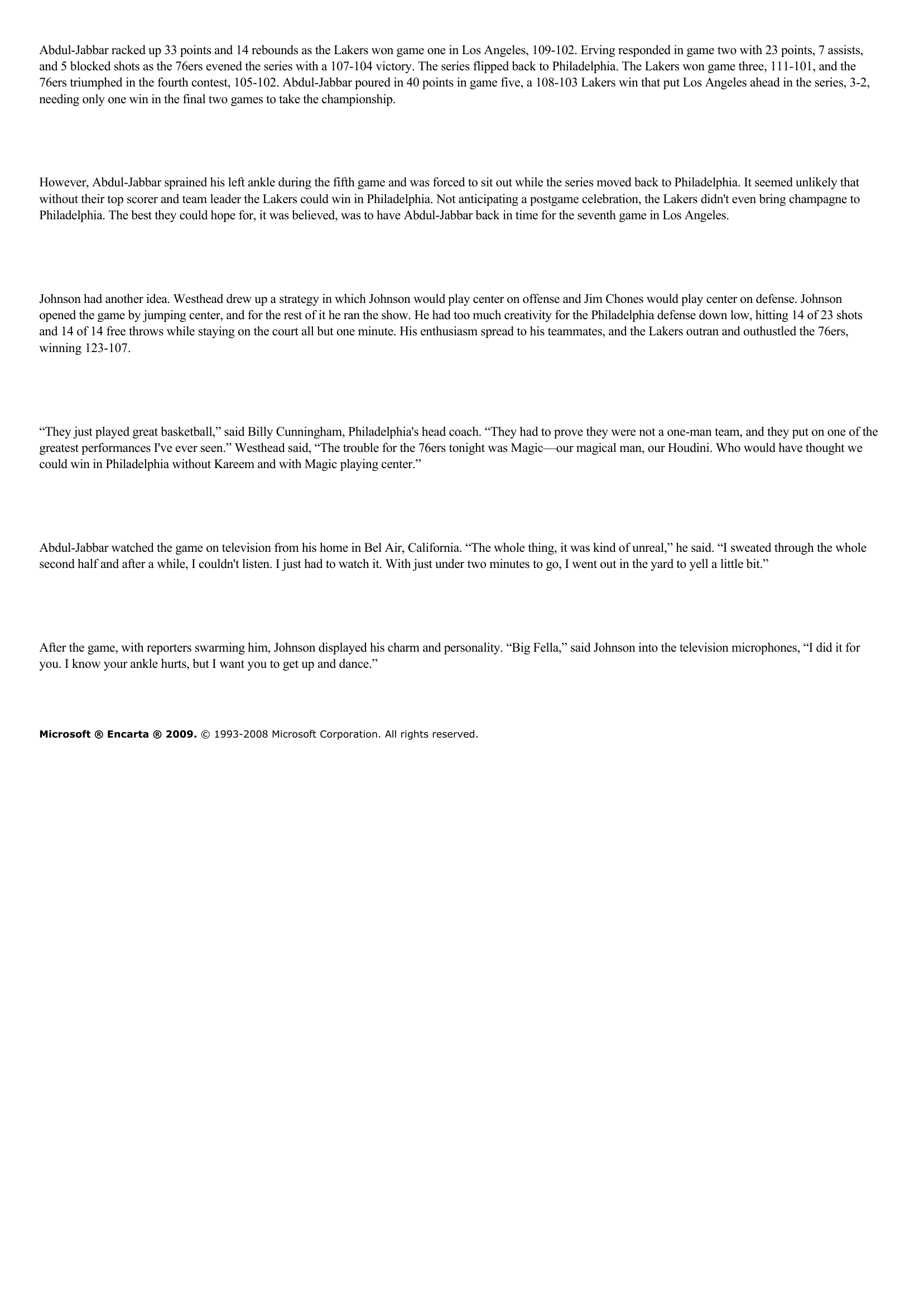Magic in the 1980 NBA Finals.
Publié le 14/05/2013

Extrait du document
«
Abdul-Jabbar racked up 33 points and 14 rebounds as the Lakers won game one in Los Angeles, 109-102.
Erving responded in game two with 23 points, 7 assists,and 5 blocked shots as the 76ers evened the series with a 107-104 victory.
The series flipped back to Philadelphia.
The Lakers won game three, 111-101, and the76ers triumphed in the fourth contest, 105-102.
Abdul-Jabbar poured in 40 points in game five, a 108-103 Lakers win that put Los Angeles ahead in the series, 3-2,needing only one win in the final two games to take the championship.
However, Abdul-Jabbar sprained his left ankle during the fifth game and was forced to sit out while the series moved back to Philadelphia.
It seemed unlikely thatwithout their top scorer and team leader the Lakers could win in Philadelphia.
Not anticipating a postgame celebration, the Lakers didn't even bring champagne toPhiladelphia.
The best they could hope for, it was believed, was to have Abdul-Jabbar back in time for the seventh game in Los Angeles.
Johnson had another idea.
Westhead drew up a strategy in which Johnson would play center on offense and Jim Chones would play center on defense.
Johnsonopened the game by jumping center, and for the rest of it he ran the show.
He had too much creativity for the Philadelphia defense down low, hitting 14 of 23 shotsand 14 of 14 free throws while staying on the court all but one minute.
His enthusiasm spread to his teammates, and the Lakers outran and outhustled the 76ers,winning 123-107.
“They just played great basketball,” said Billy Cunningham, Philadelphia's head coach.
“They had to prove they were not a one-man team, and they put on one of thegreatest performances I've ever seen.” Westhead said, “The trouble for the 76ers tonight was Magic—our magical man, our Houdini.
Who would have thought wecould win in Philadelphia without Kareem and with Magic playing center.”
Abdul-Jabbar watched the game on television from his home in Bel Air, California.
“The whole thing, it was kind of unreal,” he said.
“I sweated through the wholesecond half and after a while, I couldn't listen.
I just had to watch it.
With just under two minutes to go, I went out in the yard to yell a little bit.”
After the game, with reporters swarming him, Johnson displayed his charm and personality.
“Big Fella,” said Johnson into the television microphones, “I did it foryou.
I know your ankle hurts, but I want you to get up and dance.”
Microsoft ® Encarta ® 2009. © 1993-2008 Microsoft Corporation.
All rights reserved..
»
↓↓↓ APERÇU DU DOCUMENT ↓↓↓
Liens utiles
- NBA Finals: Most Valuable Player.
- Fairy and Fairy Tale Fairy and Fairy Tale, in folklore, a diminutive supernatural creature, generally in human form, dwelling in an imaginary region called fairyland; and the stories of its interventions through magic in mortal affairs.
- Kareem Abdul-Jabbar I INTRODUCTION Kareem Abdul-Jabbar, born in 1947, American professional basketball player, a dominant competitor who holds the record for most points in National Basketball Association (NBA) history.
- Magic Johnson Magic Johnson, born in 1959, American professional basketball player, who helped the Los Angeles Lakers become one of the dominating professional basketball teams of the 1980s.
- Michelle Kwan Michelle Kwan, born in 1980, American figure skater, one of the world's dominant skaters in the 1990s and early 2000s.




